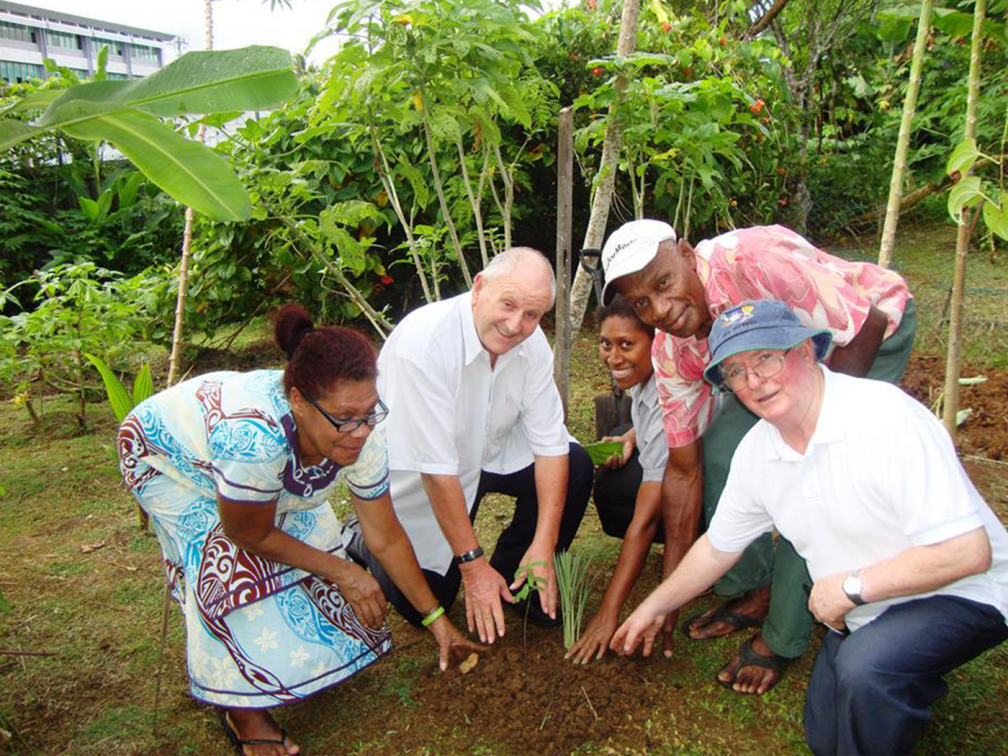Pope Francis has invited Catholics – and anyone else interested – to join a seven-year journey to widen the reach of his 2015 encyclical on the environment. The Dicastery for Promoting Integral Human Development’s Laudato Si’ Action Platform is the initiative offering opportunities for parishes, schools, Catholic organisations, communities, and families to learn and grow together towards sustainability and creation-centred spirituality.
It is ably supported by the Laudato Si’ Movement, which has come a long way since it was founded in the year the encyclical was published. I well remember a meeting at the Paris Climate talks in December 2015 where the nascent movement gathered together some of the Catholic groups in Paris who were lobbying the UN Climate meeting for action to keep global warming below 1.5 degrees celsius. Australian Columban Fr. Charles Rue and myself represented the Columbans.
What an inspiring gathering it was, and the beginning of a galvanising of Catholic support for care of God’s creation. Columban Missionaries and Westminster J&P sat alongside Caritas Internationalis, CIDSE, Trocaire, Jesuit European Social Centre, Ecojesuit, Franciscans International, Augustinian Recollects – Philippines, and Chrétiens Unis pour la Terre. There were Franciscans from India, Australia, Brazil, Netherlands and Rome, and Jesuits from Philippines, Belgium and Spain; also Capuchin JPIC from the US and Ecuador, and an Assumption priest. Ghanaian Archbishop Gabriel Justice Yaw Anokye of Kumasi, the President of Caritas Africa and the second vice-president of Caritas Internationalis, opened with a prayer and thanked God for the opportunity to be at COP21 and asked for God’s help “for us to develop our strategy to protect Earth for future generations”.
Now, seven years later, the ecumenical Season of Creation – 1st September to 4th October – has been taken on by Catholic networks, and Laudato Si’ Week is being celebrated by Catholics globally. Catholics had a very visible presence at the lobby of the United Nations’ COP26 climate talks in Glasgow last November and recent talks on Biodiversity in Geneva. Highly effective use is made of social media by the Laudato Si Movement and there is a growing network of Laudato Si’ Animators.
The invitation to celebrate Laudato Si’ Week comes as India and Pakistan have experienced roasting temperatures, and Australia and Bangladesh, unprecedented floods this year. Pope Francis has called for a “new ecological approach that can transform our way of dwelling in the world, our lifestyles, our relationship with the resources of Earth and, in general, our way of looking at humanity and of living life.”
Already, more than 4,000 church organisations and bodies – including the Columbans, Jesuits and the Salesian Sisters, the Pontifical Gregorian University and 80 Catholic colleges worldwide, the Philippines Bishops’ Conference and upwards of 1,000 families – have committed to the Laudato Si’ Action Platform. Planting trees, reducing energy use, divesting from fossil fuels and educational gatherings are amongst the initiatives to be celebrated worldwide in Laudato Si’ Week.
International events, available online, include the opening of Laudato Si’ Week on 22nd May by Pope Francis, a ‘No More Biodiversity Collapse’ webinar on the morning of 23rd May and a focus on ‘Fossil Fuels, Violence, and the Climate Crisis’ on 25th May. An all-day prayer event on 29th May takes the theme, ‘Community resilience and empowerment as part of our Synodal Journey.’ In the Philippines, Manila Cathedral will host an all-day programme on 24th May. The Jesuit Centre for Ecology in Malawi is hosting a week-long programme.
Here in Britain, Hexham and Newcastle Diocese is holding a Mass at St Mary’s Cathedral at 7.00pm on Monday 23rd May. Bishop Robert Byrne will celebrate the Mass and Fr Chris Hughes will give the Homily on ‘Hearing the Cry of the Poor and the Earth’.
On-going initiatives in England and Wales include CAFOD’s Livesimply Award and the ‘Guardians of Creation’ project which has released guidelines to help Catholic dioceses measure a baseline carbon footprint in an effort to achieve ‘net zero’.


